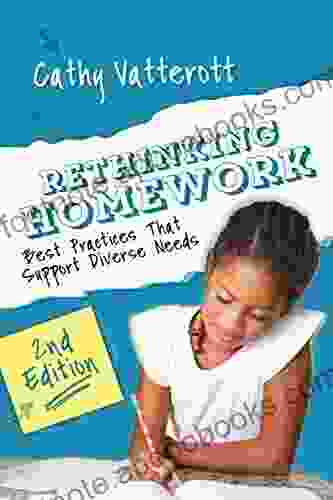Rethinking Homework: Best Practices to Support Diverse Needs

Homework has long been a cornerstone of education, but its role and effectiveness have come under increasing scrutiny. Traditional homework practices can often perpetuate inequities and fail to address the diverse learning needs of students.
In this comprehensive guide, we present a fresh perspective on homework, offering best practices that support the unique needs of all learners. Drawing upon the latest research and insights from educators, we explore innovative strategies, provide practical tips, and share inspiring real-life examples to help you transform homework assignments into meaningful learning experiences.
4.4 out of 5
| Language | : | English |
| File size | : | 625 KB |
| Text-to-Speech | : | Enabled |
| Screen Reader | : | Supported |
| Enhanced typesetting | : | Enabled |
| Word Wise | : | Enabled |
| Print length | : | 216 pages |
Understanding Homework's Impact on Student Learning
Homework plays a multifaceted role in student learning, providing opportunities for:
- Reviewing and reinforcing concepts: Homework allows students to revisit material covered in class, strengthening their understanding.
- Developing independent learning skills: By working on homework assignments outside of the classroom, students learn to manage their time, set priorities, and work independently.
- Extending and enriching learning: Homework can provide opportunities for students to explore topics in greater depth, engage in higher-Free Download thinking, and make connections across concepts.
However, traditional homework practices can sometimes have unintended negative consequences, such as:
- Exacerbating inequities: Students with limited access to resources, such as a quiet study space or reliable internet, may be disadvantaged by homework assignments.
- Increasing stress and anxiety: Excessive or overly challenging homework can create stress and anxiety for students, particularly those with learning disabilities or other challenges.
- Discouraging creativity and exploration: Homework that is overly prescriptive or lacks choice can stifle students' natural curiosity and desire to learn.
Rethinking Homework: Best Practices for Diverse Needs
To address the challenges and maximize the benefits of homework, we must rethink our approach and adopt best practices that support the diverse needs of all students. Here are some key principles to consider:
1. Homework Should Be Meaningful and Purposeful
Homework assignments should align with learning objectives and provide students with opportunities to practice and apply what they have learned in class. They should also be engaging and relevant to students' interests and experiences.
2. Homework Should Be Differentiated
Recognize that all students learn differently and at different paces. Provide differentiated homework assignments that meet the individual needs of students. This could include varying the length, difficulty, or type of assignment based on student readiness.
3. Homework Should Promote Equity
Ensure that all students have access to the resources they need to complete homework assignments. This may include providing materials in multiple languages, offering flexible deadlines, or providing support for students with technology or learning challenges.
4. Homework Should Be Scaled Appropriately
The amount of homework assigned should be appropriate for the age and ability level of students. Avoid overwhelming students with excessive homework or underutilizing homework as a learning tool.
5. Homework Should Encourage Active Learning
Design homework assignments that promote active learning and student engagement. This could include incorporating hands-on activities, project-based assignments, or opportunities for collaboration.
Practical Strategies for Transforming Homework
In addition to these principles, here are some practical strategies for transforming homework into a positive and productive learning experience:
Communicate Clear Expectations
Ensure that students understand the purpose of homework, the expectations for completing it, and the consequences for not completing it. Provide clear instructions and rubrics to guide students' work.
Provide Choice and Flexibility
Offer students choices in homework assignments whenever possible. This allows them to choose activities that align with their interests and learning styles. Consider providing tiered assignments that offer different levels of challenge.
Use Technology to Enhance Homework
Technology can be a valuable tool for homework, providing students with access to a wider range of resources and interactive learning experiences. Use apps, online platforms, or virtual tools to supplement homework assignments and make learning more engaging.
Provide Timely and Meaningful Feedback
Regularly provide students with feedback on their homework to help them identify areas for improvement. Feedback should be specific, constructive, and actionable. Use a variety of methods for providing feedback, such as written comments, verbal feedback, or online discussion forums.
Foster Home-School Partnerships
Establish open communication with parents or guardians to keep them informed about homework assignments and expectations. Encourage parents to support their children's learning by providing a conducive study environment and assisting with homework when needed.
Real-Life Examples of Effective Homework Practices
The following real-life examples illustrate how educators have successfully implemented best practices for homework:
- A middle school math teacher uses differentiated homework assignments to meet the needs of students with varying abilities. Struggling students receive assignments with additional scaffolding and support, while advanced students engage in challenging projects that extend their learning.
- A high school English teacher provides students with a choice of homework activities each week. Students can choose from a variety of assignments that cater to their interests, such as writing essays, creating presentations, or participating in online discussions.
- An elementary school teacher uses technology to enhance homework by creating online quizzes, providing access to interactive simulations, and using discussion boards for students to share ideas and seek help from peers.
Rethinking homework is not about eliminating it but rather transforming it into a powerful tool for supporting diverse student needs. By adopting best practices, providing meaningful and engaging assignments, and fostering home-school partnerships, we can create homework experiences that promote equity, encourage active learning, and empower all students to succeed.
This comprehensive guide provides you with the knowledge, strategies, and inspiration you need to rethink homework and unlock its full potential as a transformative learning experience.
4.4 out of 5
| Language | : | English |
| File size | : | 625 KB |
| Text-to-Speech | : | Enabled |
| Screen Reader | : | Supported |
| Enhanced typesetting | : | Enabled |
| Word Wise | : | Enabled |
| Print length | : | 216 pages |
Do you want to contribute by writing guest posts on this blog?
Please contact us and send us a resume of previous articles that you have written.
 Book
Book Novel
Novel Page
Page Chapter
Chapter Text
Text Story
Story Genre
Genre Reader
Reader Library
Library Paperback
Paperback E-book
E-book Magazine
Magazine Newspaper
Newspaper Paragraph
Paragraph Sentence
Sentence Bookmark
Bookmark Shelf
Shelf Glossary
Glossary Bibliography
Bibliography Foreword
Foreword Preface
Preface Synopsis
Synopsis Annotation
Annotation Footnote
Footnote Manuscript
Manuscript Scroll
Scroll Codex
Codex Tome
Tome Bestseller
Bestseller Classics
Classics Library card
Library card Narrative
Narrative Biography
Biography Autobiography
Autobiography Memoir
Memoir Reference
Reference Encyclopedia
Encyclopedia W Scott Jones
W Scott Jones Sublime Studio
Sublime Studio Catherine Redford
Catherine Redford Rory Tlc
Rory Tlc Hemanshu Prabhakar
Hemanshu Prabhakar Renato Portugal
Renato Portugal Carolyn Brown
Carolyn Brown Nobody103
Nobody103 Cath Smith
Cath Smith Michael O Tunnell
Michael O Tunnell Thomas L Friedman
Thomas L Friedman Douglas R Burgess
Douglas R Burgess Charles Henry Brase
Charles Henry Brase James Russell Lowell
James Russell Lowell Jan Fennell
Jan Fennell Matthew Harffy
Matthew Harffy Susan Kinsolving
Susan Kinsolving Jason Heard
Jason Heard Danielle Duizabo
Danielle Duizabo Thomas E Wartenberg
Thomas E Wartenberg
Light bulbAdvertise smarter! Our strategic ad space ensures maximum exposure. Reserve your spot today!

 Chadwick PowellQuest at Golden Hall: The Australian Sandstone – Dive into an Epic Adventure...
Chadwick PowellQuest at Golden Hall: The Australian Sandstone – Dive into an Epic Adventure... Guillermo BlairFollow ·8k
Guillermo BlairFollow ·8k Tony CarterFollow ·17.3k
Tony CarterFollow ·17.3k Harold PowellFollow ·2.1k
Harold PowellFollow ·2.1k Larry ReedFollow ·17.4k
Larry ReedFollow ·17.4k Harry CookFollow ·18.8k
Harry CookFollow ·18.8k Ray BlairFollow ·2k
Ray BlairFollow ·2k Emanuel BellFollow ·7.4k
Emanuel BellFollow ·7.4k Brenton CoxFollow ·10.1k
Brenton CoxFollow ·10.1k

 Angelo Ward
Angelo WardThe Original Home School: A Journey of Love, Learning,...
In the annals of...

 Heath Powell
Heath PowellAfrican American Education in Slavery and Freedom: The...
The history of African...

 Jamal Blair
Jamal BlairEmbrace the Wonder and Simplicity of Charlotte Mason...
Discover the...

 Cason Cox
Cason CoxUnveiling the Truth: A Mother's Courageous Journey to...
A Mother's Love Unbound: The Power of...

 Jamal Blair
Jamal BlairOver 100 Original Aussie Bush Ballads: A Journey Through...
Embark on a literary odyssey into the...
4.4 out of 5
| Language | : | English |
| File size | : | 625 KB |
| Text-to-Speech | : | Enabled |
| Screen Reader | : | Supported |
| Enhanced typesetting | : | Enabled |
| Word Wise | : | Enabled |
| Print length | : | 216 pages |












